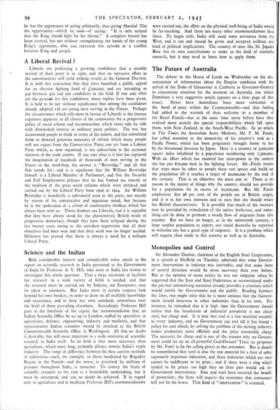Monopolies and Control
Sir Alexander Dunbar, chairman of the English Steel Corporation, in a speech at Sheffield on Tuesday, admitted that some Govern- ment intervention in industry was inevitable, and that some form of central direction would be more necessary than ever before. But in the opinion of many critics he was too sanguine when he suggested that the -Iron and Steel Federation as reconstituted under the pre-war rationalising measures already provides a structure which would satisfy the Government and the public. Reading between the lines, one might infer that he is more anxious that the Govern- ment should intervene in other industries than in his own. For instance, he remarked that it is high time the Government should realise that the foundation of industrial prosperity is not cheap steel, but cheap coal. It is true that coal is a raw material essential to every industry, and no Government can rest till it has found a policy for coal which, by solving the problem of the mining industry, makes production more efficient and the price reasonably cheap. The necessity for cheap coal is one of the reasons why no Govern- ment could set up an all-powerful Coal-Owners' Trust (as proposed by Mr. Foot) to fix the selling prices to the consumer. But it should be remembered that steel is also the raw material for a host of other supremely important industries, and these industries which use steel cannot be indifferent to its price ; and if there were a ring which tended to fix prices too high they on their part would ask for Government intervention. Iron and steel have received the benefit of protection ; the State will require the assurance that consumer, will not be the losers. That kind of "intervention" is essential.


























 Previous page
Previous page